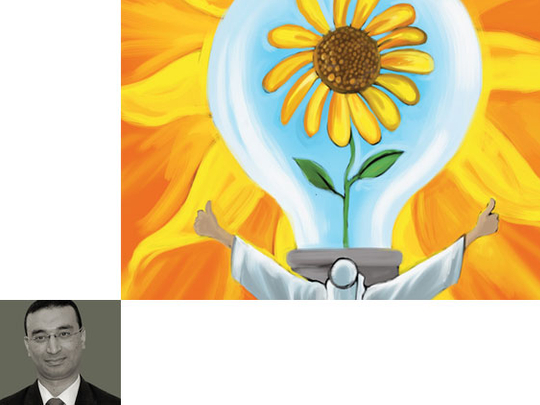
The World Future Energy Summit (WFES) 2013 has proved that the UAE is very serious about renewable energy. An example of the UAE’s keenness is the attempt to boost international efforts to fight climate change, and the transition towards green energy (future energy).
WFES has become a milestone on the international renewable energy agenda. It is growing fast and attracting more people. The sixth edition of WFES in Abu Dhabi brought together global leaders in policy, technology, investment, academia, media and civil society to discuss the future of renewable energy, energy efficiency, clean technologies, and climate change and sustainability solutions.
WFES 2013 is of special importance in the Arab world because renewable energy can diversify energy sources and help achieve energy security, thus transforming ‘brown’ economies into green economies, which is the main tool for achieving sustainable development. In the Gulf region, it is critical to diversify from petrol-based energy and invest in renewable and clean energy.
This event came at a time when the development path is being redefined for at least the next 20 years in light of the outcome of the Earth Summit Rio+20 document about ‘the future we want’ (June 2012). This document states clearly that renewable energy is an important component in shifting to a green economy and creating more green jobs.
Solutions
Currently, there are many changes locally, regionally and globally with regard to the development agenda, environmental issues, social equity, etc. Present models of development have proved to be unsustainable and renewable energy can be a key part of the solution to many of these challenges and problems.
In the Arab world, all types of renewable energy can be developed. Solar power, especially, is a very promising prospect. All applications of solar power, especially the two common methods, Concentrated Solar Power (CSP) and Thin Film PV Cells, are feasible and applicable in the Arab world.
CSP requires large-scale plants in the desert and the Thin Film PV Cells can play an important role in generating electricity in buildings as well as in remote rural communities, which are not connected to the grid, and thus help in achieving self-sufficiency. The new applications can depend on hybrid stations that work on solar power in the morning and wind power in the evening.
The Arab Gulf region, in particular, has all the elements of success in the field of renewable energy: Labour is cheap, funds can be secured and technology is being developed through companies like Masdar, the host of WFES 2013. Most importantly, there is political will. Additionally, renewable energy technology costs are falling, demand is growing, and technology is developing very fast.
WFES 2013 was unique; it witnessed the launch of a number of new projects alongside regular ones. Besides, there was the international exhibition, the Project and Finance Village, the Young Future Energy Leaders programme, corporate meetings and social events.
January marks the first year of the International Water Summit, which is held in conjunction with the WFES. The International Water Summit is the only event that focuses specifically on the water-energy nexus and the challenges this poses in an arid environment.
Initiatives
WFES 2013 saw the introduction of the Sustainable Living Area, incorporating the WFES Eco-Home endorsed by Estidama green building initiative of Abu Dhabi. As well as for the first time, there was a Green Jobs Fair.
Green jobs can be related to all sectors in any economy, especially in the renewable energy sector. There will be massive employment opportunities in this field in the future, which should be a motivation for Arab countries.
From a job creation point of view, research shows that for every one megawatt of solar energy, 15 jobs will be created across the value chain. Green jobs are jobs in any business or economy sector that provide real income generation opportunities, while reducing negative environmental impact, ultimately to sustainable levels.
There are many challenges as some types of renewable energy require more time to become available on a commercial scale and there is a serious need to correct market distortions that favour fossil fuels.
Undoubtedly, there is a pressing need for a number of enabling conditions in order to make renewable energy competitive and profitable. Price-based subsidisation (feed-in tariff), incentives and financial mechanisms that support renewable energy are necessary to overcome the obstacles and to embrace the potential.
It is a necessity to conduct continuous awareness campaigns to target various consumers (companies, households — both urban and rural) to encourage them to make the move to renewable energy.
Dr Mohamed Abdel Raouf is an independent environmental researcher.









